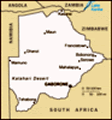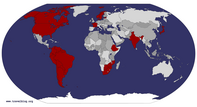Advertisement
Published: March 9th 2014
This place is special... frightening, humbling, magnificently beautiful... the Okavango
On March 1st, we arrived in Maun, the access point for excursions into the Okavango Delta, a maze of waterways and islands in northwest Botswana. This area, along with other parts of Botswana, is home to some of the highest concentrations of wildlife in all of Africa. Joining us for this stop were Daniel and Gustav, two of my classmates who themselves are stationed in Mozambique for their thesis work.
The primary goal for this leg of our journey would be a mokoro camping safari. The mokoros are small hollowed out canoes, controlled by a poler who stands at the back of the boat and uses a long wooden pole to navigate the boat through the winding, reed-filled delta, primarily using narrow channels in the reeds plowed by hippos. This time of year here is the rainy season and though we knew this before we headed towards Maun, the rainy season greeted us with open, crying skies and we were a bit concerned it would impact our trip. After reaching our accommodation, the Old Bridge Backpackers, it poured for the first 36 hours - heavy rains, thunder and lightning.
Despite the weather that had preceded our departure, we set off early on our mokoro trip on the following soggy, gray morning. This excursion begins with a one hour speed boat trip, during which the first rains of the day commenced, up the Okavango River to the mokoro station, where all mokoro trips launch from. The Mokoro itself is traditionally made out of wood, but for these tours, fiberglass mokoros are used as they can handle a heavier load. With our camping gear loaded, we settled into the puddles within the tiny boats which would be our cramped seats for the next 1.5 hours as Cedric and Jess, our two guides, pushed us along. As soon as we departed the Mokoro station, we were immersed in the sweet song of the Delta - the harmony of so many types of birds and insects and the gentle splashing sound of the Mokoro pushed through the water. The waterways are home to hippos and crocs, an intimidating thought when we're helplessly floating in the water, the lip of the boat only a few inches above the surface. Our guides, however, grew up doing this, so we put faith in them to recognize
a dangerous situation and avoid it as best as possible. Without any encounters, we arrived at a small island in the delta which would be our camp for the night, and fortunately, the rain had let up for most of the mokoro leg, but as soon as we had set up camp, the day's torrential downpour began and would persist the rest of the day.
After a few hour siesta, we set off for our first game walk of the safari. Back in the mokoros and getting poured on all the while, Cedric led us to another nearby island where we trudged directly through the tall grass and soggy earth, blazing our own trail through the bush with the exception when we'd follow an already defined path from an elephant or herd of wildebeest. For the first two hours or so our luck was pretty down, as the horizons in all directions appeared barren and we only managed to see two hippos poke their heads from a nearby pool, cautioning us with their stare to not get any closer. I think we had all pretty much given up hope for this game walk, instead thinking about dry, warm clothes
back at camp, when Phil realized that the bushes and trees 15 meters to our left were shaking pretty vigorously, a sign there was an elephant in there but out of view, hidden in the thick. We inched closer and closer trying to find an angle of sight, before realizing another elephant was just as near right behind us. We silently watched in amazement, standing so close to these massive, aggressive beasts, as wild as they come. From what we have heard, the wildlife in Botswana is not as exposed to humans as those animals in many of the wildlife viewing sanctuaries in other countries in the world, and so Botswana's animals need to be given more space than those in other parks. We gathered our photos and then quietly slipped away in gratitude to make our way back to camp. We did our best to dry off, warm up and rest up with another game walk on tap at 6:30 the following morning.
This day would be special. Beautiful colors lit the sky of scattered clouds, and our morning would begin with a heavy shot of adrenalin instead of a cup of coffee. Making our way to the
game walk via mokoro the narrow channel we had been following spit us out in a wide pool where two hippos immediately greeted us by poking their menacing faces just above the surface and staring us down. These animals are extremely aggressive and account for more human deaths than any other wildlife in Africa. Nonetheless, our guides are trained in these situations and experience them regularly, though I can't say this was a comforting thought when you're stuck inside a tiny boat a few feet away. Cedric very cautiously hugged the perimeter of the pool, making slow maneuvers and occasionally raising his pole high in the air to "look big" before slapping it hard against the surface of the water to "look tough" to the hippos. In response, the hippos bellow a forewarning laugh. Slow and steady we reached the other side of the pool, locked eye-to-eye the whole way across... an intense, horrifying, humbling and beautiful experience. Now grateful to be on foot, this day would be rich with wildlife. Five minutes into our walk we were standing a few feet from a mixed herd of wildebeest and zebras. Shortly after Cedric spotted giraffes on the horizon. We moved

 Action hippo-poo shot - these guys mark their territory in such a manner
Action hippo-poo shot - these guys mark their territory in such a manner
They swirl their stubby tails like a helicopter blade to get the job done.towards them and soon we were just a few feet away from a group of 17 giraffes (called a tower). They would eat and curiously look up at us, sometimes all of them staring at once. Next we found more elephants and watched them eat their breakfast. As we continued, we caught a fleeting glimpse of an elusive animal called a civet cat (which resembles a cat but is not actually a feline). Then, in the distance, 5 ostriches on the move sprinting across the horizon.
For all of these sightings, we stood there as just part of the landscape... simply on foot, no protection of any kind or gear on hand, only equipped with the experience of our guide and his binoculars... blending into the landscape that is the delta. Our full exposure in this sense, made this experience so much more amazing. Guides are not allowed to carry guns, so the protocol in these scenarios varies depending on the situation. If an elephant is coming at you, hold your ground. If a water buffalo is charging, run for the nearest tree and climb.
It was an amazing day, and the cherry on top was the picture
perfect weather of blue skies and scattered clouds. We made two stops on our way out of the delta to swim and cool off. Later that night, we toasted our beers to a great day, but we still had one more delta adventure in store, weather permitting. The next morning, we woke to a blue sky without a cloud in it... perfect conditions for our scenic flight over the delta. Our pilot, whose identity I will protect for reasons you will soon find out (let's call him "Bill"), smoothly led the four of us into the skies in his single-engine and we soon were hovering over the maze of a landscape, appearing in places as a million distinct lakes, ponds and waterways, though in actuality it is one, with its interconnections hidden by thick patches of reeds. We saw elephants, hippos, water buffalo, ostrich, crocs, impalas, kudus and giraffes all from above. Then, half way into the flight, "Bill" requested we "not take pictures for the next few minutes" and then maneuvered the plane to about 10 feet off the ground, hovering just above the earth and weaving in and around trees. At one point we passed two playing hippos
and then an elephant just a few meters beyond the wing at eye level. Like so many of the experience during these days, incredible and heart-rate elevating. After seeing the vastness of the delta from above, it was clear how lucky we had it the day before on our amazing game walk.
The following day would be another far-from-luxurious travel day. A 5 am taxi to take us to the bus station for a 5:30 minibus trip to a town called Nata, where we would then connect to another minibus to Kasane a border town to Namibia, Zimbabwe and Zambia and also the gateway to Chobe National Park. The first leg of the minibus trip was uncomfortable but the wildlife along the road made it seem like a safari. We had passed at least 10 elephants just grazing along the highway until we were forced to a stop by large bull elephant standing directly in the middle of the road. He squared us up, spouting while flailing his ears and trunk. Eventually he inched to the shoulder and the driver slammed on the gas on the far side of the two lane road. As we made our move, the
elephant charged the at us and got within a few meters before we got past him and to the safety of the open road.
Kasane has been a mostly uneventful, yet necessarily so, pit stop on along our way. With a thirst for adventure quenched for the moment, we've been exploiting our comfortable accommodation along the Chobe River to get a lot of thesis work done and I must say we've been quite productive. Of course however, we can't pass through the Chobe area without some kind of safari in Chobe National Park, which, like Okavango, is a wildlife jewel of Africa, and so yesterday we did an afternoon boat safari down the Chobe River which separates the Caprivi Strip of Namibia from Botswana, with the Botswana riverfront part of the Chobe National Park. Once again, we saw hippos, elephants, kudus, water buffalo, baboons, crocs and we were particularly gifted with watching four young elephants, including a 1-2 month old, drink from the river just feet away. We savored this show for several minutes until some nearby hippos bullied the elephants out of their territory. So with that, a lot of solid thesis work and a great river cruise
experience, we're putting a fork in Kasane... and Botswana.
Tomorrow we head into Zimbabwe for a visit to Victoria Falls.
A lot of photo credit to Phil on this one!
Advertisement
Tot: 0.247s; Tpl: 0.017s; cc: 20; qc: 75; dbt: 0.1906s; 1; m:domysql w:travelblog (10.17.0.13); sld: 1;
; mem: 1.3mb
























Ann Luckett
non-member comment
Wow!
Eric, this is so wonderful - like watching a fabulous documentary. What an incredible experience for you. What is the degree you are pursuing?